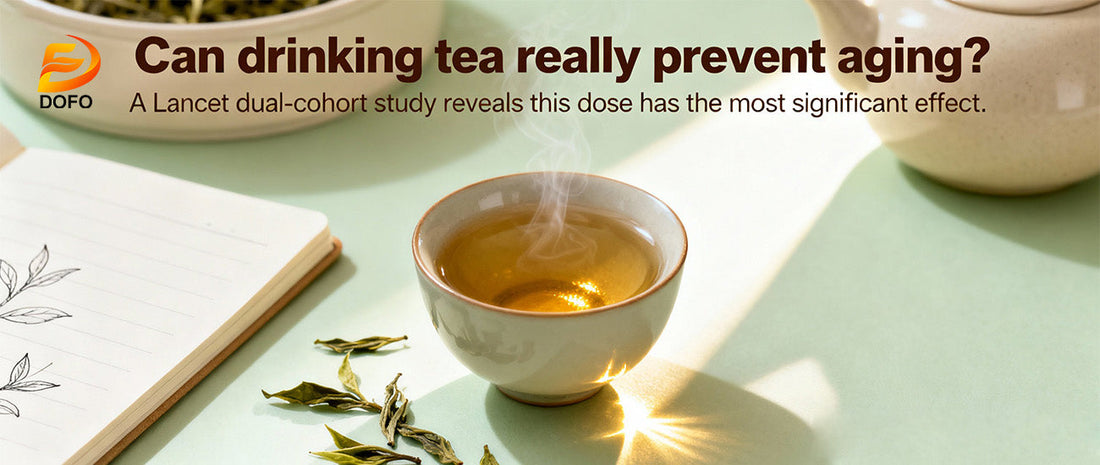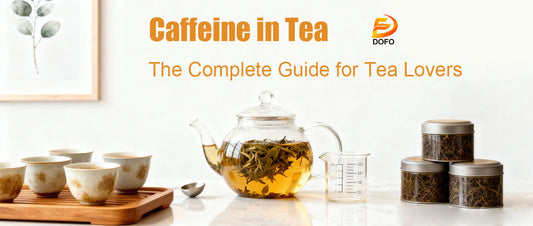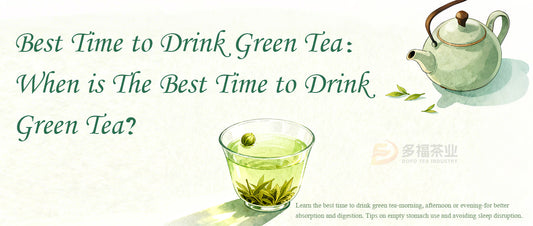
Can drinking tea really prevent aging? A Lancet dual-cohort study reveals this dose has the most significant effect.
HHShare
Population aging has become a global challenge, and how to delay biological aging and extend healthy lifespan through controlled interventions has been a research hotspot in recent years.
A study published in《 The Lancet Regional Health–Western Pacific offers》 new health implications for the daily beverage "tea."
By analyzing data from two populations in China and the United Kingdom, the study confirms that regular tea consumption is significantly associated with a slower acceleration of biological age (BA), and that there is a clear "optimal" intake.
One、Why is this study noteworthy?
Unlike previous small-scale or single-population studies, the core strength of this study is its rigor:
1. Dual-cohort validation:
The study included the China Multi-Ethnic Southwest Cohort (CMEC), 7,931 individuals aged 30-79, and the UK Biobank (UKB), 5,998 individuals aged 37-73, with follow-up periods of 1.98 and 4.5 years, respectively.
These studies encompass populations with diverse genetic backgrounds and lifestyles, making the results more universal.
2. Scientific Evaluation Indicators:
The Klemera-Doubal method (KDM) is used to calculate "biological age acceleration," integrating 15-18 clinical indicators, including blood pressure, blood lipids, blood sugar, and liver and kidney function (e.g., CMEC includes systolic blood pressure and glycated hemoglobin, and UKB includes body fat percentage and C-reactive protein).
This method better reflects the degree of physiological aging compared to "chronological age."
3. Innovative Study Design:
A "change-change analysis" tracks the association between changes in tea drinking habits (e.g., from no tea drinking to drinking) and BA acceleration.
Furthermore, the exposure-response relationship between tea consumption and anti-aging effects is explored in people with stable tea drinking habits, avoiding the limitations of traditional cross-sectional studies.
Two、3 key findings clearly demonstrate the relationship between tea drinking and anti-aging.
1. Effectiveness is evident even after starting tea drinking.
In the CMEC cohort, those who switched from non-tea drinking to tea drinking experienced a significant decrease in BA acceleration (β=-0.319, 95% CI: -0.620 to -0.017). The UKB cohort showed a similar trend (β=-0.267).
Although this finding did not reach statistical significance due to the small sample size, the direction was consistent, suggesting that initiating tea drinking has a positive effect on delaying aging.
2. Continuous tea drinking yields more consistent benefits than occasional tea drinking.
Both cohorts showed that those who consistently drank tea experienced a more pronounced decrease in BA acceleration than those who drank intermittently (β=-0.354 for continuous tea drinkers in the CMEC cohort).
This suggests that the anti-aging effects of tea drinking require long-term maintenance and are unlikely to be accrued through short-term interruptions.
3. Optimal Dose: 3 cups per day (or 6-8g of tea)
Exposure-response analysis confirmed that BA acceleration exhibited a nonlinear relationship with increasing tea consumption, initially decreasing and then leveling off. The anti-aging effect peaked at 3 cups (approximately 200ml/cup) or 6-8g of tea per day.
Increasing the amount of tea consumed did not significantly improve the effect, consistent with the "low-dose hormesis" effect of bioactive substances.
Three、 Why Does Tea Have Anti-Aging Potential? The Mechanisms Behind It Are Supported
 Tea's anti-aging potential stems primarily from its rich content of polyphenols (such as epigallocatechin gallate (EGCG) in green tea and theaflavins in black tea):
Tea's anti-aging potential stems primarily from its rich content of polyphenols (such as epigallocatechin gallate (EGCG) in green tea and theaflavins in black tea):
- Direct Effects: Scavenging free radicals, inhibiting inflammation, and reducing oxidative stress-induced cellular damage;
- Indirect Regulation: Modulating epigenetic changes (such as DNA methylation), activating mitochondrial function and autophagy, and delaying cellular aging;
- Intestinal Interactions: Modulating the gut microbiome, reducing harmful metabolites, and indirectly improving immune and metabolic homeostasis.
Four、 Objective View: This study has three limitations.
The three limitations are as follows:
-
Information on tea consumption relies on self-reporting, which may be subject to measurement errors such as inconsistent cup sizes and recall bias.
-
It does not distinguish between different types of tea, such as green tea, black tea, and oolong tea, making it impossible to definitively determine which tea has the best anti-aging effect.
- As an observational study, while controlling for confounding factors such as age, gender, smoking, and underlying medical conditions, residual confounding cannot be completely ruled out, and thus cannot be equated with causality.
Five、Discussion: Practical Recommendations
While "three cups of tea a day" can be incorporated into a healthy lifestyle, it is important to note that:
-
Tea should not replace core anti-aging measures such as a balanced diet, regular exercise, and smoking cessation and alcohol restriction.
-
Avoid excessive tea consumption (e.g., more than five cups a day) to reduce the potential for caffeine-induced insomnia, palpitations, and other discomforts.
- Special populations (e.g., those with anemia or gastric ulcers) should adjust their approach based on their individual conditions and consult a doctor if necessary.
Every cup of tea nourishes longevity - DoFo tea is always with you.
This study provides high-quality evidence for "daily beverages as an aid in anti-aging" and also provides a simple and easy-to-use option for achieving "healthy aging" - perhaps from today on, you might as well make a cup of tea and make a small contribution to delaying aging.Have a cup of DoFo Tea now and enjoy a relaxing moment.









